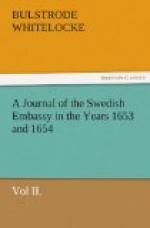She took out a paper of notes, written with her own hand in Latin, her observations upon the articles.
1. After Whitelocke had read the first article, she said there was nothing therein which needed explanation.
2. The second, she said, would require consideration, and read out of her notes the words “communis interesse,” which she desired Whitelocke to explain what was meant by them. He told her those words included matter of safety and matter of traffic. She then demanded why the Baltic Sea was named as to free navigation, and not other seas likewise. Whitelocke said the reason was, because at present navigation was not free in the Baltic Sea; but if she pleased to have other seas also named, he would consent to it. She asked if he would consent to freedom of navigation in America. Whitelocke told her he could not, and that the treaties of the Commonwealth were comprehended within the bounds of Europe. She asked him what he thought the Protector would do in case she demanded that liberty. He said, his Highness would give such an answer as should consist with the interest of England, and show a due regard to her Majesty.
3. This third article she said she would agree unto, but she thought it necessary that a form should be agreed upon for certificates and letters of safe-conduct, that ships might pass free upon showing of them. Whitelocke said, he thought there would be no need of them, especially if the peace with the Dutch were concluded. She replied, that if the war continued it would be necessary.
4. She said she thought there would be no need of this article, and read another which she herself had drawn in Latin to this effect—“That if any hereafter should commit treason, or be rebels in one country, they should not be harboured in the other.” Whitelocke said, the article was already to that purpose, and he thought it necessary for the good of both nations. She said, it would be too sharp against divers officers who had served her father and herself, and were now settled in Sweden. Whitelocke offered that amendment which he before tendered to the Chancellor, which when she read, she told Whitelocke, that might include all those men whom she mentioned before. Whitelocke said, that, upon inquiry into it, he found not one excepted by name from pardon. She said, for anything to be done hereafter, it was reasonable, and she would consent to it. Whitelocke said, that if any hereafter should come into her country, who were excepted from pardon, it was also reasonable to include them in this article.
5. She said that this and the second article would require further consideration; because if she should consent thereunto, it would declare her breach of the neutrality which she had hitherto kept. Whitelocke told her, if the peace were concluded with the Dutch, that neutrality would be gone; and if the war continued, he presumed she would not stick to declare otherwise then that neutrality. She said that was true, but she desired that this and the second article might be let alone until the issue of the Dutch treaty.




